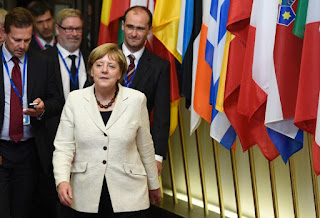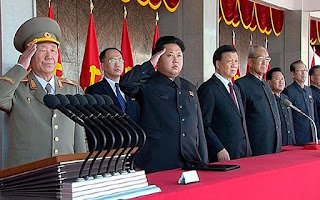An uncommon compassion by Germany for the horde of asylum seeker rushing to Europe for refuge.
An
uncommon compassion by Germany for the horde of asylum seeker rushing to Europe
for refuge.
By E. Stanley Ukeni
In a show of the sort of impeccable leadership that is
expected of a steward of a sizable proportion of the world’s wealth, the German
leadership has expressed a preparedness to accept up to 800,000 asylum seekers
this year. This is in the face of an unprecedented migration of mostly war
displaced refugees who are seeking safe haven in Europe.
In a decisive policy move, the government of Chancellor
Angela Markel announced that Syrian refugees who enter Germany would be
permitted to seek asylum protection irrespective of where they entered the
European Union from—a policy shift from the normal asylum application process.
I here submit that history, and indeed providence, will
judge the nation and people of Germany honorably for this altruistic act of kindness
towards the helpless and the infirm. In fact, with this singular gesture of
humane compassion, Germany may have demonstrably erased its past history of
being branded as intolerance and unwelcoming to strangers.
During this largest movement of people since the Second
World war, Germany stands out in Europe, and indeed the entire world, as a
beacon of hope for a suffering mass of humanity who long for sanctuary. And the
country has reached out to these needy refugees with bold confidence—from a
position of strength.
What we are seeing here is an unwitting branding of Germany
as a core compassionate country—one that confidently accepts the weighty
responsibility of global leadership.
It would seem that Germany’s new Willkommenskultur or ‘Welcome
Culture’ is being embraced nationwide. Although there
still remains small clusters of a vocal ultra-rightwing holdouts that still
insist on holding onto the old ways of shunning foreigners.
The whole world is indeed watching and taking notes—with
muted admiration, as Germany leads Europe with compassion amidst a colossal
migration crisis that is proving to test the very foundation of Europe’s common
union.
I was quite intrigued to read, in a news story, about a
village called Elchingen, in the German state of Bavaria, where a group of local native created an
organization called the ‘Friends of Asylum Seekers’.
I have to admit, this is not the sort of story one normally
expect to read about small German town and villages. It was a charming story
that strengthened my faith in the noble quality of the human spirit. I hope
this inspiring gesture of kindness and compassion endures the test of the
German psyche.
It is in Germany after all, just a year ago, that vicious
racist group such as the Pegida movement unleashed the Continent’s most brutal,
hate-fueled, assaults on refugees—which included arson attacks on refugee
centers. Let’s not be naive, the sentiments that these groups espouse is still entrenched
in the psyche of a small but vocal segment of the German population. However,
it’s probably more entrenched in eastern Germany, which has remained somewhat
unwelcoming to foreigners.
Political commentators can recall that it was equally in
Germany where, in the 1990s—when a surge of refugees flooded into Germany from
the former communist bloc countries to escape the scourge of the Balkan war,
that the government took a harsh position against them. The then Chancellor
Helmut Kohl echoed the popular sentiment of Germans at the time, when he stated
bluntly that Germany was “not an immigrant country”. In other words those
hoping to take refuge in Germany were not welcomed.
But is seems that a new, more compassionate Germany is
emerging—a 21st Century Germany. A new opportunity for Germany to
redefine itself came after a weekend that an influx of 20,000 mostly Middle
Eastern migrants and asylum seekers entered Germany from Hungary. The
staggering number of new arrivals necessitated the government of Germany
reassure its citizens that it was quite capable of handling the crisis.
In a demonstration of this new welcoming spirit of the
German State, Chancellor Angela Markel—in a hastily organized news conference
in Berlin, stated unambiguously, “I am happy that Germany has become a country
that many people outside Germany now associate with hope.” This is a telling
remark that speaks volumes of an emerging German global brand.
Indeed, Germany is embracing this challenge of welcoming
hundreds of thousands of the world’s huddled masses with the sort of optimism
and confidence that used to be aptly exhibited by only a superpower nation.
Amid the compassionate optimism, all Germans agree that
their country cannot, and must not, shoulder the burden of this crisis all
alone. Many of the country’s political leaders are now turning to Brussels to
evolve an equitable system of shared responsibility amongst the EU 28 nations
States.
It seems to me that Germany’s recent move to temporarily
close its border to the horde of asylum-seekers is aimed at compelling
reluctant European leaders to accede to a quota system of redistributing
refugees across the European Union.
This article is
authored and published by E. Stanley Ukeni. Copyright © 2015. All Rights
Reserved. This material and other articles or stories posted on this blog site
may not be reproduced, published, broadcast, rewritten or redistributed, in
whole or in part, without prior expressed written permission from the author,
E. Stanley Ukeni.









Comments
Post a Comment